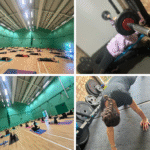
- Posted by Hannah
- June 27, 2025
Coming Back to Balance: My Recovery Journey from Hypothalamic Amenorrhea and Hormonal Healing
For years after the acute phase of my illness and in an effort to pursue health, I thought I was doing everything right—eating clean, training hard, staying lean, and pushing through life with discipline. But somewhere along the way, my body started whispering… then shouting. And I wasn’t listening.
The Wake-Up Call: Hypothalamic Amenorrhea
When my period disappeared, I told myself it was just due to stress and so I didn’t think a lot of it. Fast forward a few more years and I put it down to being a sign of being in “great shape.” But deep down, I knew something was off and that a missing period and fractured pelvis wasn’t quite right. Bloodwork confirmed it: low oestrogen, low progesterone, and low T3. Hypothalamic amenorrhea. My body was in survival mode, and my hormones had hit pause.
I remember reading the word “hypothalamic” and feeling overwhelmed. It sounded clinical, foreign—even a little scary. But what it really meant was that my brain (specifically the hypothalamus) had told my body it wasn’t safe to ovulate. And it made sense. I wasn’t fuelling enough, I was overexercising, over working and I was stressed more often than not.
Understanding Low T3: The Metabolism Mirror
One of the most eye-opening pieces of my research was on low T3 (triiodothyronine), an active thyroid hormone. T3 is essential for metabolism, energy, and warmth. When it’s low, it’s often because the body is conserving energy—slowing down metabolism to cope with a perceived famine or threat. It wasn’t just my reproductive system that was affected; it was my whole system. My cold hands and feet, brain fog, and low energy suddenly made sense. Wrapping up in spring suddenly made sense
Low T3 wasn’t a separate problem—it was part of the bigger picture of under-fuelling and overexerting.
Nutritional Next Steps: Rebuilding Trust with Food
One of the hardest parts of recovery was confronting my relationship with food and I’ve always been transparent about that . I had to eat more—more calories, more carbs, more often—and let go of restriction. It wasn’t just about eating enough; it was about sending my body the message that it was safe again.
Some of the shifts I made:
- Prioritising consistent meals and snacks, even when I wasn’t hungry.
- Focusing on whole food carbs—grains, fruit, root veggies—to support thyroid function and ovulation.
- Including healthy fats without fear—avocados, nut butters, olive oil, seeds. I LOVE the PB date combo.
- Reducing high-intensity workouts and replacing them with gentle movement, rest, or nothing at all.
Food stopped being about control and started being about nourishment, together with enjoyment
Fears and Anxiety: The Emotional Terrain of Recovery
Let’s be real: recovery is not linear. I had moments of panic—fears of weight gain, doubts about whether I was doing it right, anxiety about letting go of my routines. And sometimes these thoughts still hit me hard.
I worried:
What if I never feel like “me” again?
What if I gain weight and still don’t get my period back?
What if I lose control?
Will the weight gain eve to stop?
Will Brad still love me?
But what I’ve learned is that healing isn’t about going back to who you were. It’s about becoming someone stronger—someone more in tune with their body, more compassionate, and more at peace. I’ve also learned that weight gain isn’t failure—it’s often the first visible sign of internal healing and of a brighter future.
Proud of My Progress: Healing from the Inside Out
Today, I feel proud. Not just because some hormones have improved (though they have!), or because my energy is better, or my T3 has started to rise. I’m proud because I kept showing up—for myself, for Brad and for our future.
I’ve learned to listen more closely to my body and to redefine what health really means. It’s not a number on a scale or a perfect macro split—it’s a hopefully regulated cycle, a nourished body, a calm nervous system, and the ability to live a full, joyful life.
To Anyone Going Through HA Recovery
If you’re in it now, please know: you’re not alone. It’s hard. It’s confusing. It’s emotional. But it’s also temporary—and entirely worth it.
Your body wants to heal. Give it the space, the fuel, and the kindness it needs. Trust the process. And when you start to feel that flicker of energy return, that warmth in your fingers, or the first sign of a cycle—celebrate. Your body is coming back to you.
And you’re not just recovering your period.
You’re recovering yourself. For your future.



